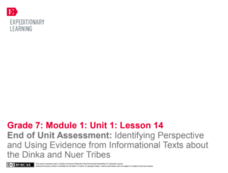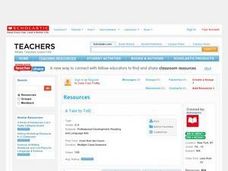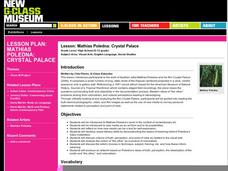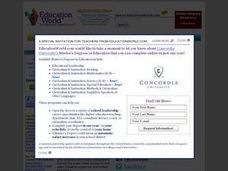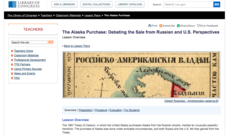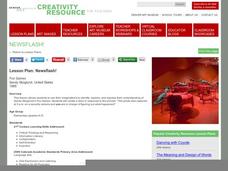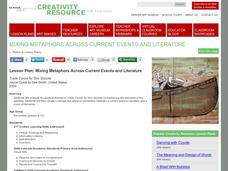American Psychological Association
Using Psychological Perspectives to Answer Questions on Behavior
Perspective is everything when it comes to assessing human behavior. Class members examine a series of statements and identify the perspective represented by each to demonstrate their understanding of different psychological perspectives.
Advocates for Human Rights
A Global Perspective on Immigration
To gain a global perspective on immigration, groups investigate and create a map of the migration patterns in Africa, Asia, Europe, Latin America, and the Middle East. Class members then examine the background, immigration history, and...
K20 LEARN
You Think You Have Problems: Perspective in Multi-Genre Literature
Young scholars are asked to reflect on how personal experiences might influence points of view and perspectives. They read poems and biographies of the poets and then match the poem to the poet. To justify their matches, learners...
Curated OER
Penny Basketball: Making Sense of Data
Explore four web-based interactive sites to develop a baseline understanding of statistics. Learners play a series of penny basketball games and collect data regarding their shooting statistics. Groups decide who is the "top" penny...
EngageNY
Analyzing the Author’s Perspective: “Equal Rights for Women” by Shirley Chisholm
It's all about perspective. Scholars talk about the meaning of perspective and look closely at the point of view of Equal Rights for Women. They discuss how Chisholm addresses the views of others and complete a close reading guide to...
EngageNY
Studying Conflicting Information: Varying Perspectives on the Pearl Harbor Attack, Part 2
Scholars take another look at Japan's Fourteen-Part Message. They then take turns adding ideas to sentence starters to create ideas about the different perspectives of government. To finish, groups mix and mingle to share their sentences...
EngageNY
End of Unit Assessment: Identifying Perspective and Using Evidence from Informational Texts about the Dinka and Nuer Tribes
Pupils consider the varying perspectives of people in different cultural groups as they read an informational text about the Dinka tribe of Southern Sudan and complete graphic organizers. They also respond to a constructed-response...
K20 LEARN
The New Colossus: Determining Author's Perspective
Introduce young scholars to the concept of the author's perspective with a lesson that uses Emma Lazarus's poem, "The New Colossus," as the anchor text. Groups use a T-chart to identify words that reveal the author's point of view of The...
K20 LEARN
The History of Spoken Word Poetry: Historical and Cultural Perspectives In Literature
Spoken word poetry, more than almost any other form, reveals the historical and cultural perspective of the poet. High schoolers listen to various spoken word poems, select one to research in-depth, and then apply what they have learned...
EngageNY
Analyzing the Author’s Perspective: “The Shakespeare Shakedown”
Simon Schama's article "The Shakespeare Shakedown" allows young writers to see how authors respond to conflicting viewpoints. Class members participate in discussion appointments with five peers to explore the author's point of view.
Scholastic
A Tale to Tell!
A creative spin occurs when one pupil acts as author Ann M. Martin. Using a Q & A at the back of her book A Dog's Life, other classmates ask the "author" questions. They discuss the reasons why they know the book is from a...
Curated OER
Lesson 1: English-Indian Encounters
What did the English settlers think of the Native Americans inhabiting the Chesapeake region of the United States? Learners analyze a series of documents and images to determine the English perception of the local inhabitants. A great...
Curated OER
Lesson: Mathias Poledna: Crystal Palace
Film analysis takes critical thinking, connections, and context. Upper graders look at the film installation, Crystal Palace in terms of the film makers choices, presentation, and perspective of truth. After an analytical discussion of...
Curated OER
Working on the Slant
Compare and contrast a major news story from various newspapers. How does the perspective change? Are certain things included in some of the stories and left out of others? Have pupils complete a graphic organizer to compare how...
C-SPAN
Survey Analysis- Public Perceptions of Voting and Elections
The perception of fairness in elections becomes more important with each passing election. Using data from a C-SPAN poll, budding historians consider the differences between how people perceive elections. The resource includes videos of...
Library of Congress
The Alaska Purchase: Debating the Sale from Russian and U.S. Perspectives
Seward's Folly or brilliant strategic move? Class members investigate primary source documents from each country to determine the rationales behind the sale and purchase of Alaska, and then stage a debate.
Curated OER
The Hundred Penny Box with Multiple Viewpoints and Persuasive Letter
Third graders read The Hundred Penny Box and complete comprehension activities. In these perspectives and letter writing lessons, 3rd graders read and discuss the story then complete a Venn Diagram to explore the different viewpoints in...
Curated OER
Create a Magic Lantern Show; Freed People in the Reconstruction South
Engage your scholars by having them create "magic lantern shows" inspired by the film Dr. Toer's Amazing Magic Lantern Show: A Different View of Emancipation. As they study the South's Reconstruction through primary sources, learners...
Curated OER
Lesson Plan: Newsflash!
Fox Games is an Installation piece that allows observers to walk through a clay environment. Kids analyze the piece, considering storytelling and perspectives of light. They imagine how different the piece would look at various times of...
Curated OER
Lesson: Mixing Metaphors across Current Events and Literature
Expression, current events, and art can go hand-in-hand. After analyzing a multi-media piece entitled, Trade Canoe for Don Quixote, the class explores their own expressive process. They create collages that show a current event or issue...
Curated OER
Lesson: A Fitting Situation
In the Enemy's Country is a painting that depicts several Native Americans dressed and ready for war. Youngsters analyze the artistic and storytelling elements the artist used to convey his idea. They then write a creative piece from the...
Curated OER
Native American Perspectives
Discover the unique perspective of a Native American in the Woods Canyon Pueblo by reading stories and answering questions. Afterward, your class will consider their own ancestry and culture and compare it to the Pueblo culture.
Curated OER
Literary Response and Analysis Theme Literature
Analyze the central idea or literary theme found in a series of quotes from the Shakespearean play, Hamlet. For literary analysis, learners paraphrase excerpts from the play and then identify the characters' motivations for their speech.
National Endowment for the Humanities
The Matter of the Philippines
The United States won the Spanish-American War, so now what? Young scholars act as advisors to President McKinley and use primary sources to recommend what America should do with its territories. Using a variety of perspectives—including...








